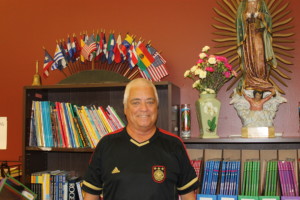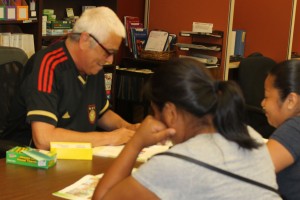Phil Rivera brings a full career in education – as a Teacher, Department Head, Supervisor, and Assistant Principal in Baltimore County Schools – to his Volunteer position at the Esperanza Center.

Phil Rivera brings a full career in the field of education to his work in curriculum development and teacher training at Catholic Charities Esperanza Center.
“Phil serves a tremendous need here,” says Diana Siemer, English Language Program Coordinator. “I really need the help, since I’m the only full-time paid staff person.”
“I have a miniscule budget. I was very happy to get an Ignatian Volunteer. And with his credentials, background, and experience, Phil’s value to us is even greater than I’d hoped for. The whole idea of teacher mentoring, training, curriculum development has been a perfect match. I needed as much professional development as possible for our volunteer teachers. He is pretty much in charge of these areas, and we’re always working together.”
The Esperanza Center is a program of Catholic Charities of Baltimore which serves a mostly immigrant community and provides English classes, legal services, and dental and medical care. Phil serves with the adult English as a Second Language (ESL) program, which serves 400 students a year with just one full-time staff member and between 50 and 100 volunteer teachers.
Phil’s work at the Esperanza Center has included enriching the curriculum for the 5 levels of ESL classes, coordinating teacher training sessions each semester, and being present during classes to provide informal feedback and support to teachers. The program is set up as one-on-one, teacher to student, and lessons are personalized based on students’ needs, following an eight-week curriculum. Themes include practical topics like family, work, food. Phil encourages the use of games, books, props, picture cards, and even taking lessons outside to neighborhood grocery stores and banks for vocabulary and other practical language applications. The goal is to make the lessons creative, interactive, and as practical for students’ lives as possible.
“Our volunteers are wonderful. In the evenings, college and graduate students come teach from the University of Maryland, Johns Hopkins, and Loyola University. It really is an inspiration,” says Phil.

Phil works with two adult students at the Esperanza Center
Diana adds, “Volunteer teachers come to us with just their hearts in the right place – they want to serve. They do not have training or background in ESL. They are open to instructional support. Phil is really good at making suggestions to hopefully make good teaching great teaching. We want to make it easy for teachers and as effective as possible for student goals. ”
Students who come to the Esperanza Center’s ESL classes are recent immigrants. While the majority are Spanish speakers, students also come from Asia, the Middle East, Africa, and Eastern Europe. Nearly all come to the classes to find employment, or to get a better job.
“Our students are just amazing,” says Phil. “They’re very serious, committed adults. They have many demands on their time and they make it a priority to be in our classes to learn English. We make the lessons as engaging as possible so they’ll come back. Students may at first feel daunted by coming. At the Esperanza Center, we welcome them, get to know their names, and once they continue to come, they really gain confidence and they progress. They don’t waste the opportunity.”
When asked about the value of ESL classes for their student population, Phil says, “It’s really important. If you’re thrown into a society where you don’t know the language, you’re lost. The classes expose people to the language, to hearing it and speaking it with others. It’s immediately applicable in the street, at work, with their children. It helps the family. It’s such a critical need and I’m happy to be able to serve here.”
